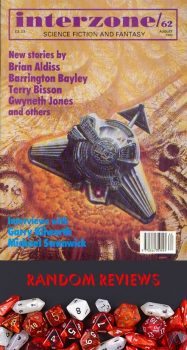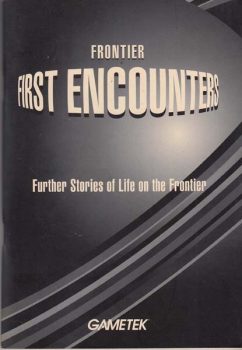Random Reviews: “Children of a Greater God” by Julian Flood

One of the issues with selecting stories to read using a completely random method is that some of the stories won’t be of particular interest, won’t completely succeed (or in some cases fail entirely), or not be particularly noteworthy. Eight weeks into this series, I have come across a story that I didn’t entirely bounce off of, but which didn’t really work for me. It has some interesting ideas behind it and I think it is clear that the author knew what he had in mind. I just don’t think he was particularly successful in translating it to the page.
Julian Flood published ten short stories, with nine of them appearing between 1992 and 1997 and three of those appearing in the first year. Half of his fictional output appeared in the pages of Interzone. The August 1992 issue of that magazine (whole number 62) contained his third story, “Children of a Greater God.”
The action is set on the planet Dub’s World, which is not conducive to human existence. The atmosphere of the planet is such that people need to have their bodies rebuilt each evening, although Flood isn’t entirely clear on the various mechanisms that cause this to happen aside from some hand waving about the atmospheric composition of the planet and people connecting to robots for the rebuilding.
Flood’s narrator is either an alternative comedian or a private eye (or some combination of both), although there is nothing humorous about his act, which includes self-mutilation and violence. Flood does have his character discuss comedy with the nightclub owner, noting that “Funny’s not what alternative comedy’s about,” although he doesn’t offer what he, or his character, thinks it is about.

His stint as a comedian appears to be part of his attempts to locate a missing woman, who was last seen at the comedy club in question. Since it is the only lead he has, he pursues it as much as possible, which seems to simply be performing at the club and hoping she’s show up again. In the meantime, he regenerates each night at a fleabag hotel and dickers with the club owner, while hoping that the person who hired him to find the girl doesn’t decide he isn’t doing enough.
The scenario is complex and it appears that Flood knows how everything in his world fits together, but it doesn’t come together on the page, which offers some clues about the way the world works, but doesn’t really tie anything together. On top of that, the narrator doesn’t seem to have a moral core. Although he has a job to do, he does it in the strangest, least effective way possible. He demonstrates that he has no compunction against killing innocent bystanders if they get in his way, and at no point does he question his actions. Things are just the way they are.
The story is short, only filling four pages in its original publication in Interzone. Although the world and characters Flood portrays are not inviting, it does seem that if he had been able to extend the story, provide more background to the world, and explore his narrator’s motives and personality the story would have been stronger.
 Steven H Silver is an eighteen-time Hugo Award nominee and was the publisher of the Hugo-nominated fanzine Argentus as well as the editor and publisher of ISFiC Press for 8 years. He has also edited books for DAW, NESFA Press, and ZNB. His most recent anthology is Alternate Peace and his novel After Hastings was published in 2020. Steven has chaired the first Midwest Construction, Windycon three times, and the SFWA Nebula Conference 6 times. He was programming chair for Chicon 2000 and Vice Chair of Chicon 7.
Steven H Silver is an eighteen-time Hugo Award nominee and was the publisher of the Hugo-nominated fanzine Argentus as well as the editor and publisher of ISFiC Press for 8 years. He has also edited books for DAW, NESFA Press, and ZNB. His most recent anthology is Alternate Peace and his novel After Hastings was published in 2020. Steven has chaired the first Midwest Construction, Windycon three times, and the SFWA Nebula Conference 6 times. He was programming chair for Chicon 2000 and Vice Chair of Chicon 7.
What’s your method of random choice? Do you have a database of all the stories you have access to? Do you just grab something from the ISFDB somehow?
As for this story, that was a year or so before I started getting Interzone, so I haven’t read it! Looking though the ISFDB, I must have read about five stories by Flood — the one in Analog, the two in tomorrow, and the latter 2 in Interzone. I don’t remember any of them, alas.
I have a personal database of the 42,262 short stories in my collection (as of receipt of the March/April issue of F&SF earlier this week). To randomly select a story, I have the database sorted by story title and then I toss five dice, color coded to the ones, tens, hundreds, thousands, and ten-thousands column. Then I have to dig the resulting magazine out of wherever it happens to be stored (or find the file in the case of e-copies).